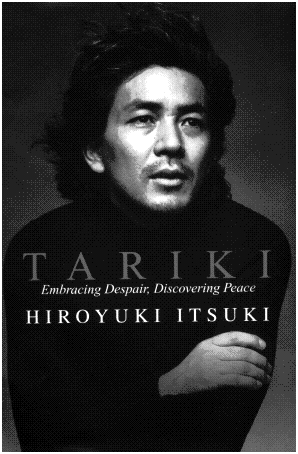 Tariki:
Tariki:
Embracing Despair, Discovering Peace
Hiroyuki Itsuki
Kodansha: New York, 2001
229 pp.; $21.00 (cloth)
In Tariki: Embracing Despair, Discovering Peace, Hiroyuki Itsuki recounts an episode from a modern play about the life of Shinran, the thirteenth-century founder of Jodo Shinshu (True Pure Land) Buddhism. “Master, I have been feeling so sad lately,” confesses Yuien, one of Shinran’s close disciples. “Sometimes, even just watching people walking down the street, I am overcome by a feeling of sadness and I start to weep. . . . Does even a person such as yourself, master, feel sad at times?”
Shinran replies, “I am sad, too. But, Yuien, the sadness you are feeling now and my sadness are a bit different. Your sadness will pass with time. It is a sadness that can be cured, but the sadness I feel is a profound, weighty sadness that has sunk deep into my very bones.” The message of Tariki, rendered elsewhere in the book with such eloquence, is here, I think, most perfectly laid bare in the image of a sadness that cannot be cured but continues to deepen over the course of a lifetime, until finally it touches bone. Tariki is a rarity: a book of hard truths that leaves us feeling softer, more centered and alive; a book on despair and human depravity that inspires us to live with honesty, compassion, and hope.
Itsuki himself is no stranger to despair. A celebrated novelist who, at age forty-nine, turned abruptly to the study of Buddhism, he confesses to having considered suicide twice. “Life experience can bring anyone to a precipice,” he admits, “especially in times of historical upheaval.” For Itsuki such a time of upheaval came during World War II, when he and his family were living in Korea under Japanese colonial rule. There he witnessed the realities of war and deprivation through the unclouded eyes of a child. Remembering a postwar political poster that read, “Let us never again see the faces of starving children,” Itsuki recalls, “I said to myself that it was the faces of starving adults I never wanted to see again. . . . There is nothing as frightening as a hungry adult.” These experiences, though valuable as existential memoir, have a broader purpose that becomes apparent as Itsuki begins to consider the teachings of Japanese Pure Land Buddhism. Pure Land itself came out of a similarly dark period in human history, when Japan was rocked by internal strife and an unprecedented series of natural disasters that struck in a short span of time, a period when, according to Itsuki, human life was “no more valuable than a pebble.” Itsuki explains the Pure Land teachings by discussing their three principal proponents: Honen (1133-1212), who first established Pure Land as an independent school by declaring that nembutsu (reciting Namu Amida Butsu, “I take refuge in Amida, the Buddha of Infinite Light and Life”) alone was sufficient to gain rebirth in the Pure Land; Shinran (1173-1263), who deepened that teaching by exploring its meaning within Buddhism as a whole; and Rennyo (1415-1499), who carried Pure Land into all corners of Japanese society. Even here, however, Itsuki’s personal vision takes the fore. For what we are offered is less a history lesson than a window on the soul of a man who is, like all of us, groping his way along, looking at history and the spiritual teachings of the past for a wisdom that seems sadly lacking in our own time. “To put it simply, these three religious leaders give me the strength to live this difficult life, to go on without giving up.” It is a modest claim compared with those made so often for spiritual teachers today, but then, considering how honest Itsuki is about human nature and about himself, it is perhaps the more impressive after all.
That, finally, is the value of the book—its tremendous honesty and lack of calculation in trying to take us in. As a how-to teaching on the practice of nembutsu it offers less than most. A true Buddhist existentialist, with a healthy sense of postmodern fatalism, Itsuki doesn’t put much stock in the actual words of the chant, preferring, like Shinran before him, to rely ontariki, the “Other Power” of Tathagata that saves us at the very instant we cease relying on the self. “You might as well chant something that expresses your devotion and gratitude to a power beyond your own. In this terrible world of ours, all that counts is that you mentally clasp your hands in gratitude and say your thanks for being alive. Do this every day; do this to keep yourself aware and open whether you are in the grip of terrible suffering or are experiencing boundless joy.” It is a simple prescription which, in the true spirit of Pure Land tradition, can be practiced by one and all. ▼
Thank you for subscribing to Tricycle! As a nonprofit, we depend on readers like you to keep Buddhist teachings and practices widely available.